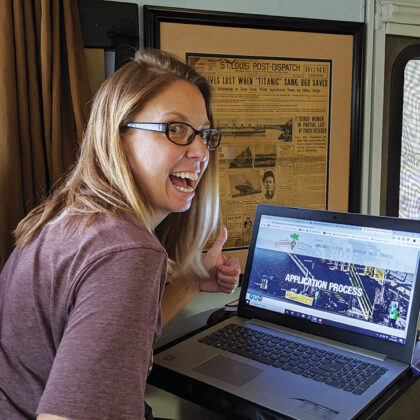One year, a couple who had an interview during the summer for a winter job in Florida were sure that had a job. They called back in September and October to confirm. However, when they arrived in November after driving hundreds of miles, the owner would not return their calls and it appeared they did NOT have a job.

by Jaimie Hall Bruzenak
While I do not know all the details of this particular situation, this brings up two steps in the job-finding process that can help Workampers avoid something similar.
Close On The Deal
In the beginning of an interview, the employer is usually telling you about the job, selling you on the position. Once you sense interest in your qualifications, the roles switch and the employer becomes the buyer and you the salesperson.
Some interviewees mistake early buying signs or interest as a job offer. Even though an employer is offering details about the job – such as starting date, compensation, etc. – that is not necessarily a job offer.
As career columnist George Gurney stated, “…assume [that] positive statements [during the interview] are nothing more than interview courtesies. The compliments are the niceties that grease the wheels of interview conversation.”
Just like in any sales, once you receive buying sings from the employer, it takes another step. You have to “close the sale” by asking for the order. This means continuing to show enthusiasm about the job and reiterating the reasons why the employer should hire you, plus – ask for the job. Remember, the employer or “buyer” wants to be reassured he/she is making the right decision.
The mistake Workampers can make is that they stop selling themselves too soon. One reason might be the Workamper isn’t sure that this is the best job to take and is still shopping around. However, the employer can sense that noncommittal attitude and lack of enthusiasm. Someone who wants the job will say things like, “I know I/we would be a valuable addition to your staff. We are hard workers, etc. I/we would really like to work here.” After giving the employer time to reply, ask “Where do we go from here?”
If you don’t get a definite job offer, then followup with questions like, “We are very interested in working here. Is there any other information we can provide to help you make your decision?” Or, “Do you have any reservations at this point about hiring us?” You may find out that the employer has more interviews or may have returning Workampers he’s not sure about.
At this point, you should know where you stand: job offer, definite interest, or conditional on other interviews/circumstances. Whether or not you have a definite job offer at the end of this conversation, be sure you know the next step and et agreement to check back if you haven’t heard anything by a certain date.
Written Agreement
Your main protection against a job falling through is to get a written agreement. That shows that both parties are committed; that you have mutually agreed on a fair deal.
In the case where an employer does not have a standard agreement, you can either refer them to the sample at Workamper.com or offer to write up your understanding of what was discussed and send it to them for their signature.
Make sure you have the signed agreement in hand before you begin traveling.

Calls to Confirm
Of course, I do recommend keeping in contact and calling/texting before you begin driving to a job if you lined it up in advance. When you do call to confirm, stay in the selling mode. Keep your enthusiasm up and reiterate that you are a match and really want to work there. That helps avoid “buyer’s remorse.”
When you call, also check to see if anything has changed. In your last call before heading to the job, go over all details of your agreement one more time. If you have thought of any new questions, ask those too. For example, you might need to double-check on the size of your RV site or whether you’ll have a 30 or 50-amp hookup.
Changes
Some Workampers have arrived to find new owners or new managers that do not feel obligated to follow the agreement. If there has been a change in management or ownership, ask to talk to the new person. Verify that the agreement, as-signed, is still in effect. You could even request that the new person add their signature. After all, you could be driving a considerable distance at a cost to you in time and money. If they aren’t going to honor the agreement, it is better to find out now than after your arrival.
Even though there are cases where one part changes, or tries to change, the agreement after arrival, your written agreement gives you something definite and there is less likelihood of change or no job.
Showing them the agreement with their signature is often all it takes. Keep any dated notes you took during the interview and copies of emails or texts as backup to show along with the agreement.
There are, unfortunately, people who will not hold to their word. However, if you are up-front and professional and take these steps, you decrease your chances of a job falling through. Plus, you increase your chances of ending up in a Workamper position that is a match and exactly what you had agreed upon.
Thanks for reading the Gone Workamping blog from Workamper News. Join Workamper.com today to see all the new job opportunities for RVers, as well as the training and resources to confidently find the right Workamping job for you – easily and securely.






